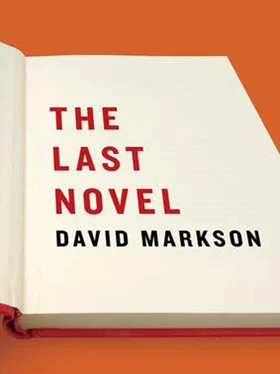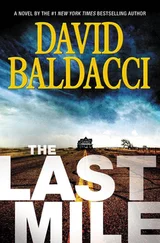David Markson
The Last Novel
Again—
For Sydney, for Duncan, for Toby
And for Trish Hoard
Painting is not done to decorate apartments.
PICASSO
If there wasn’t death, I think you couldn’t go on.
STEVIE SMITH
There are six floors in Novelist’s apartment building. Then again, the paved inner airshaft courtyard is at basement level, making seven.
And then the roof.
From high up on the Sistine ceiling scaffolding, Michelangelo was known to now and then drop things — brooms, even fairly long boards.
Most frequently, it appeared, when the pope happened to be lurking below for a glimpse at his latest efforts.
When I die, I open a bordello. You know what is a bordello, no? But against every one of you — all — I lock shut the door.
Said Arturo Toscanini, to a recalcitrant orchestra.
As a talisman for the future while still young and penniless, Balzac once sketched a large blank representation of a picture frame on one of his garret walls — and designated it Painting by Raphael.
Old. Tired. Sick. Alone. Broke.
A Frenchman in Delft in 1663, looking to purchase inexpensive art, was shown a Vermeer — on display in a pastry shop.
Almost certainly being held there as security for a debt of Vermeer’s to the baker.
Keats stayed up all night on the occasion when he actually did first look into Chapman’s Homer — and then composed his sonnet so swiftly that he was able to messenger it to a friend to read before breakfast.
Van Gogh, in a letter from Arles, some few weeks after having presented a piece of his ear to a woman in a brothel:
I went yesterday to see the girl I had gone to when I went astray in my wits. They told me that in this country things like that are not out of the ordinary.
Shelley, in a letter from Venice, on Byron’s local innamorati:
The most ignorant, the most disgusting, the most bigoted; countesses smell so strongly of garlic, that an ordinary Englishman cannot approach them. Well, L.B. is familiar with the lowest sort of these women, the people his gondolieri pick up in the streets.
The unimaginably cramped cell in which St. John of the Cross was once imprisoned for months, beaten repeatedly and virtually starved, but where he nonetheless managed to compose some of his finest verses.
In a building that no longer exists — but can still be seen in El Greco’s View of Toledo.
At least once, Flaubert informs readers that Emma Bovary’s eyes are brown.
And several other times that they are black.
Sigmund Freud ran his household in such a rigidly patriarchal manner that his wife was literally expected to have spread the toothpaste on his brush each morning.
Old. Tired. Sick. Alone. Broke.
All of which obviously means that this is the last book Novelist is going to write.
Anton Chekhov died in Germany. His coffin arrived in Moscow in a freight car — distinctly labeled Oysters.
During their first four years in the East Hampton farmhouse where they would live until Pollock’s death eleven years later, Jackson Pollock and Lee Krasner could not afford to install plumbing for heat and hot water.
Clarence Darrow went out of his way to inform A. E. Housman that he had recited two pieces of Housman’s verse in avoiding the death penalty for Leopold and Loeb, even presenting Housman with a copy of the courtroom summation — which showed he had misquoted both.
Claude Monet’s admission, after standing beside the deathbed of someone he had loved — that in spite of his grief he had spent much of the time analyzing which pigments comprised the color of her eyelids.
That day being come, Caesar going into the Senate house and speaking merrily unto the soothsayer, told him, The Ides of March be come. So be they, softly answered the soothsayer, but they are not yet past.
Says North’s Plutarch.
A woman’s body is not a mass of flesh in a state of decomposition, on which the green and purplish spots denote a complete state of cadaveric putrefaction.
An early critic presumed to inform Renoir.
The devil damn thee black, thou cream-fac’d loon;
Where gott’st thou that goose look?
— Wrote Shakespeare in Macbeth.
Now friend, what means thy change of countenance?
— Substituted William Davenant, in a rewritten version that was played for almost a century.
His last book. All of which also then gives Novelist carte blanche to do anything here he damned well pleases.
Which is to say, writing in his own personal genre, as it were.
The first one-man artist’s exhibition on record — put together by Gustave Courbet in Paris in 1855.
In a tent just outside the official group show that had rejected him.
Preoccupied with a poem-in-progress, Paul Valéry once paused to glance at a proof sheet in the window of a printing shop, and then without quite realizing it began to mentally revise the lines.
Until it embarrassingly dawned on him that he was rewriting Racine and not himself.
Vermeer died in 1675. At which time one of his largest debts was, in fact, to a Delft baker.
For bread to feed a family of thirteen.
In November 1919, after a solar eclipse had irrefutably verified Einstein’s concept of relativity, British physicists convened a major press gathering to announce it. The New York Times assigned the story to a man named Henry Crouch — a golf reporter.
An eccentric, dreamy, half-educated recluse in an out-of-the-way New England village cannot with impunity set at defiance the laws of gravitation and grammar. Oblivion lurks in the immediate neighborhood.
Said Thomas Bailey Aldrich of Emily Dickinson.
The William Sakspere of Gloucestershire — who was hanged as a thief in 1248.
Along with a letter of homage, Berlioz sent copies of the score of The Damnation of Faust to Goethe.
Who never responded.
Venomously malignant. Noxious. Blasphemous. Grotesque. Disgusting. Repulsive. Entirely bestial. Indecent.
Being among the critical greetings for Leaves of Grass.
Not to omit ithyphallic audacity.
Plus garbage.
Profound stupidity. Maniacal raving. Pure nonsense.
Among some for the best of Shelley.
Which was also called abominable.
Infantile. Absurd. Driveling. Nauseating.
Reserved for Wordsworth.
For the rain it raineth every day.
Actually, Goethe had been gratified by Berlioz’ letter. But then showed the Faust score to a now long-forgotten minor German composer — who informed him it was valueless.
After the 1953 Laurence Olivier film of The Beggar’s Opera, Britain’s Inland Revenue Service repeatedly sent inquiries regarding an address for John Gay — from whom they had not received income tax returns.
1732, Gay was buried at Westminster Abbey in.
I like Mr. Dickens’ books much better than yours, Papa.
Said one of Thackeray’s daughters.
At the height of his career, Richard Brinsley Sheridan had become the owner of the Drury Lane Theater. And subsequently astonished everyone concerned by calmly drinking in a nearby coffeehouse when it went up in flames:
Surely a man may be allowed to take a glass of wine by his own fireside?
What would you think this artist puts on canvas? Whatever fills his mind. And what can be in the mind of a man who spends his life in the company of prostitutes of the lowest order?
Inquired a review of François Boucher by Denis Diderot in 1765 — when libel was evidently an absent concept.
An unmanly sort of man whose love life seems to have been largely confined to crying in laps and playing house.
Читать дальше












